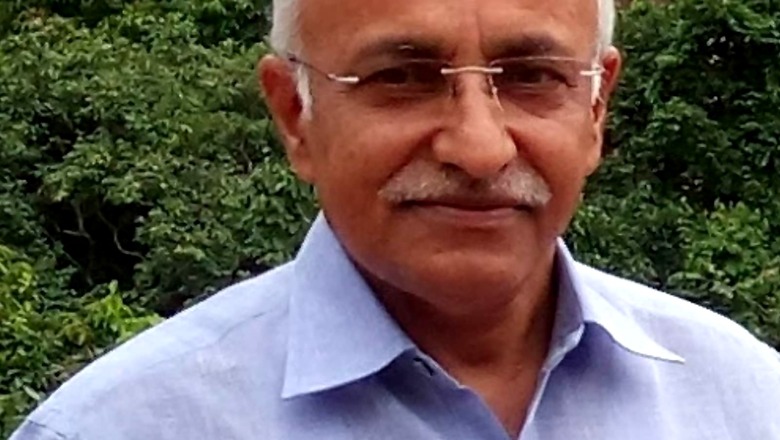
views
A year and a half after the Coronavirus pandemic wrecked our collective lives, our society has been grappling with fear and insecurity. As a result, we have seen misinformation spread like wildfire, and many resorting to bizarre and incorrect methods of dealing with the virus. With this column, which will be published every Sunday, we aim to address any health or vaccine-related question our readers might have about the coronavirus pandemic.
In this week’s column, Dr. Ramji Singh, Executive Director of AIIMS, Kalyani, West Bengal has answered questions about how COVID-19 impacts muscle mass and memory.
Does COVID 19 impact our muscle memory and mass?
Muscle memory (also known as motor learning) is actually a procedural memory that consolidates any motor task into memory through repetition. When a movement is repeated over time, long-term muscle memory is created for that task, eventually allowing it to be performed with little to no conscious effort. Whereas, Muscle mass is the size of the muscle, which can be increased by exercise and training.
Covid-19 infection impacts these significantly, both due to the disease process and added to that, the lack of movement significantly exacerbates muscle loss, while movement can feel impossible with the energy-draining disease. To make matters worse, muscle atrophy increases fatigue, making the movement even less likely.
Muscle memory mainly lies in the nervous system, which is also affected. One may have the memorised movement but precision may be lost, mostly due to loss in strength and coordination. This can be restored mostly by retraining and exercise.
Is COVID 19 a challenge to the physiology of ageing?
Yes, like any disease, COVID-19 also affects the physical condition of the individual and thus affecting ageing. Studies have clearly suggested that COVID-19 infection has increased the death rate in the elderly across the world almost in a similar percentage. However, the studies also point out that almost all deaths were reported in aged persons with comorbidities.
How can vaccine hesitancy be addressed more effectively in India?
There is hesitancy in every corner of the world and so in India. The reasons may be different. So, the approach to deal with it should be to address the root cause. Most importantly, the hesitancy is mainly due to ignorance and rumors. We heard the stories of few persons in remote villages of parts of the country, how they motivated people to go for vaccination. We have to look for such people at the village level, who has the trust of the villagers, who can convince them. Further, everyone who has taken the vaccination should motivate at least two more people to get the vaccine. This is the same approach as the COVID-19 infects people. This way, I believe we can reach the maximum population.
Why are younger people more prone to adverse vaccine effects than the older population?
Children and younger people are not adults. The immune system in them responds differently to vaccinations than an adult’s immune system. Typically, vaccine dosage is based on factors like weight, age, and how that particular vaccine moves throughout the body. If a dose is too low, it may be ineffective. If it’s too high, it can cause severe adverse effects. Further, there is a lack of sufficient data about the suitable dosage for the age group. Therefore, we have to wait for approval. As such, the seropositive study suggested that children and younger generations are already exposed to COVID-19 infection as it was found to be more than 65%.
What is the Physiology of cardiomyocyte injury in COVID-19?
Studies suggest that a substantial number of COVID-19 patients without prior heart disease develop cardiac dysfunction. They had elevated troponin and interleukin levels. A substantial subset of these patients showed reduced left ventricular function by echocardiography. The observations indicate that direct effects on cardiomyocytes by interleukins and SARS-CoV-2 infection can underlie heart disease in COVID-19 patients.
Is a booster shot necessary to give us better protection from the delta variant?
Booster shot increases the immune response. The second dose of vaccine is a booster shot to the first. The immune response goes to a peak and then slowly decreases over weeks and months. Studies (Pfizer) suggest that a third dose may be necessary for protecting the Delta variant. However, the primary aim is to vaccinate maximum people to control the spread. However, scientists and governments are waiting for more results.
How to make the newer variants of coronavirus less powerful?
One thing making the development of an effective vaccine or drug against the novel coronavirus so difficult is the fact that a virus constantly changes over time. The researchers worldwide have already registered 100 different variants of SARS-CoV-2.
This is a normal development because the genetic material of viruses gradually mutates, creating new subtypes. These mutations can also change the characteristics of a virus, causing the original virus to either weaken or become more aggressive.
These different variants also explain why a virus can trigger infection waves of varying severity in different regions of the world, and why infections can also progress very differently in different people.
At present, precaution and vaccination looks an effective way to weaken the infection.
Read all the Latest News, Breaking News and Assembly Elections Live Updates here.


















Comments
0 comment